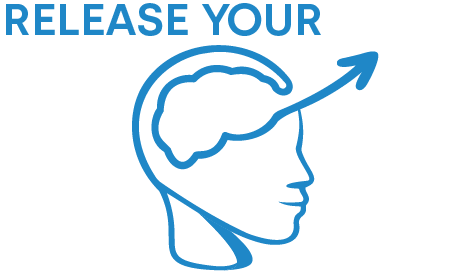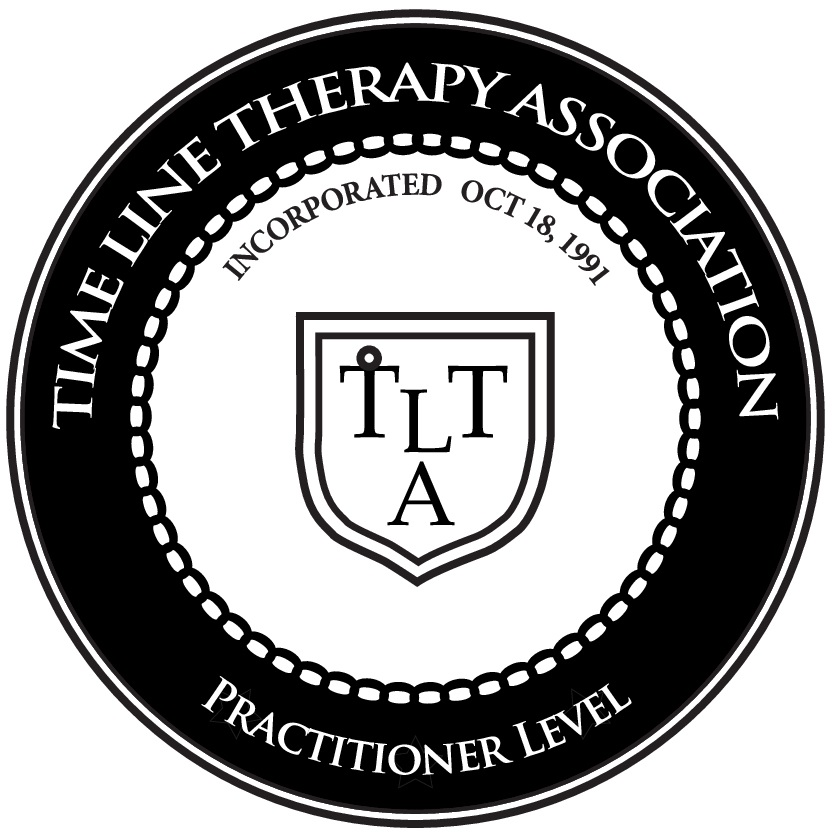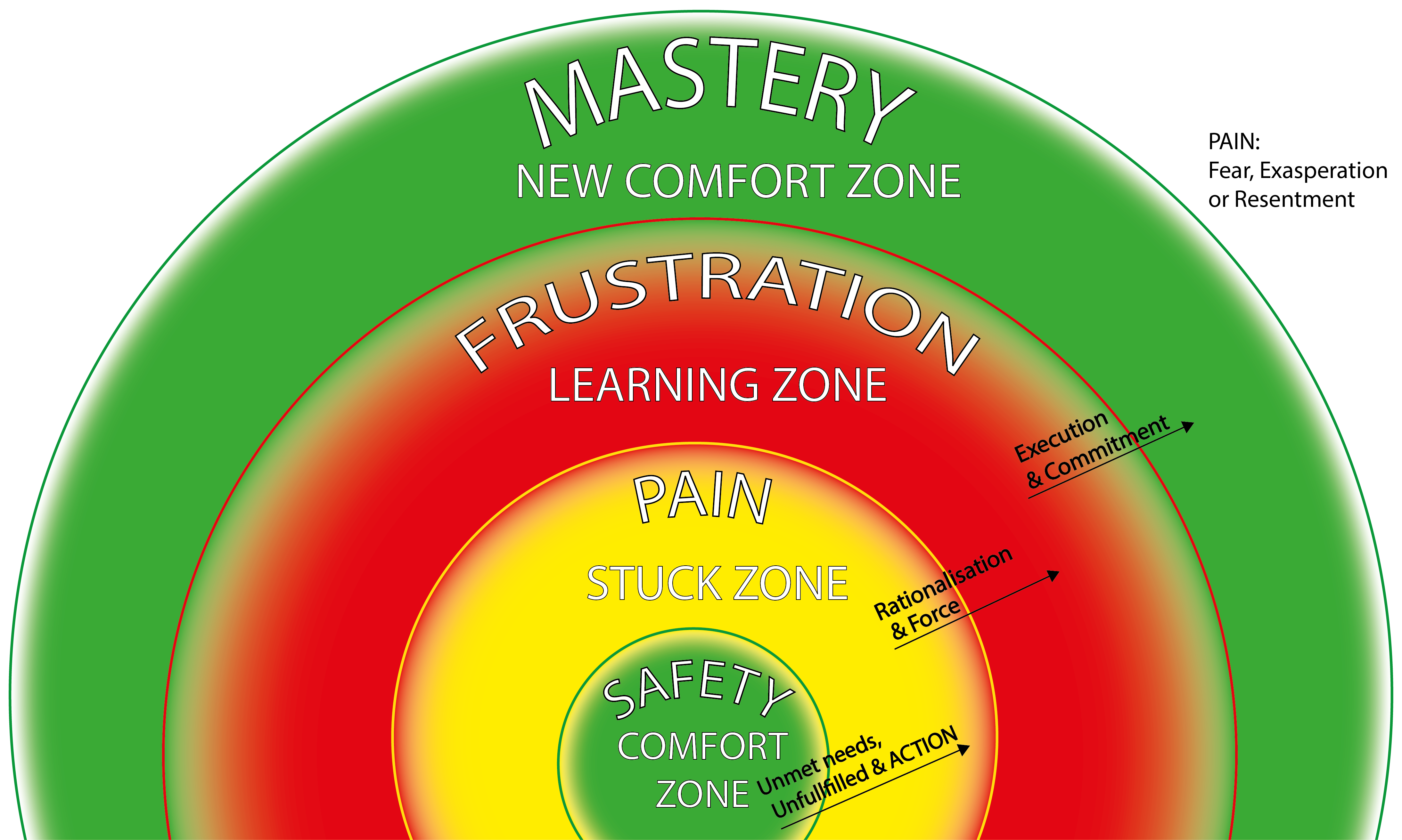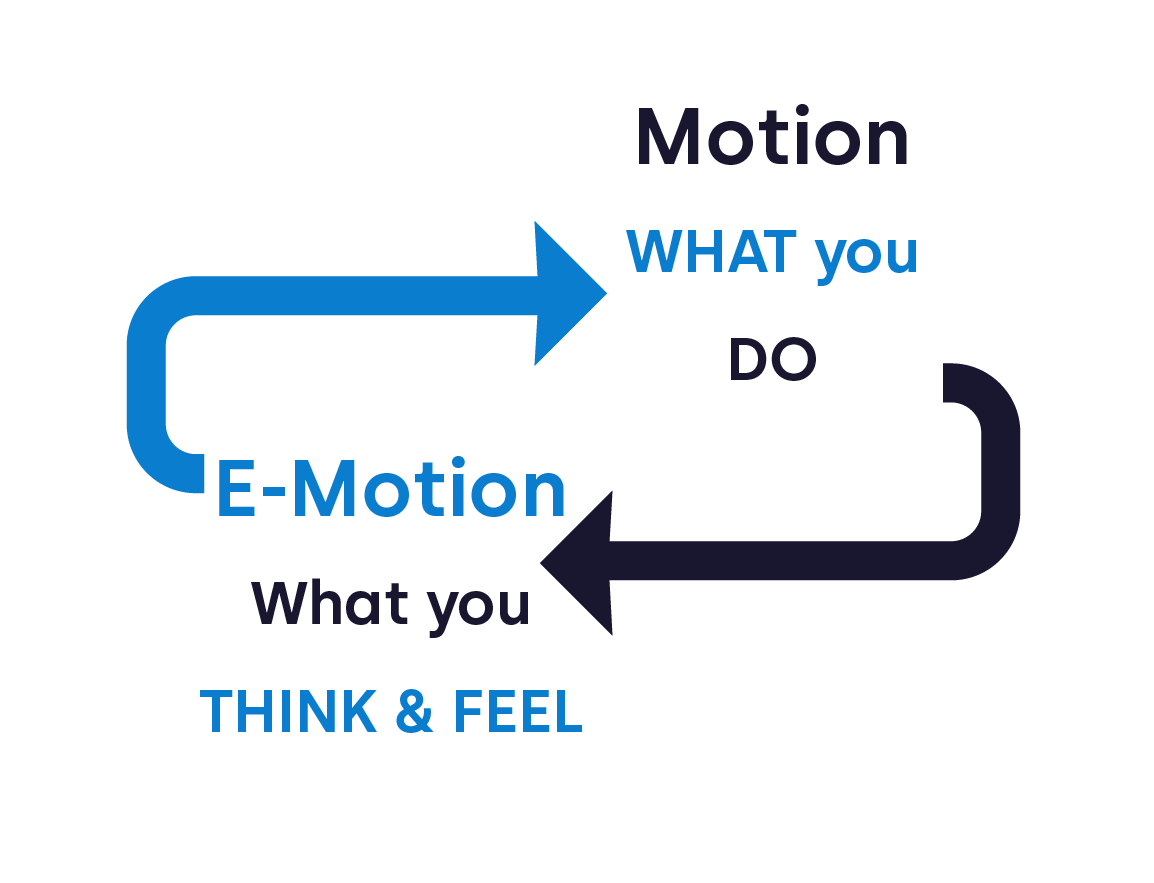Mind map – What will you get from this article?
Is this FOR you?
By the end of this article, you will have :
☑️ Discovered the complexities of your mind’s 8-step unconscious sequence, helping you understand yourself better and grow as a person.
☑️ Mastered the art of retracing your thoughts, using the 8-step sequence as a powerful roadmap for self-reflection, growth, and behavioural improvement.
☑️ Discovered how this process enhances your self-awareness, becoming your catalyst for productive change and personal development.
☑️ Recognised the profound impact of heightened self-awareness on your ability to interpret, act, and react to events in your life.
Is this like YOU?
� Have you ever caught yourself in cycles of reactions without understanding why?
� Would you like to enhance your self-awareness and gain better control over your thoughts and behaviours?
� Would you like to know the unconscious sequence that drives your mind’s responses?
What will you learn?
You will dive into the understanding of your mind’s 8-step sequence, uncovering the process of interpreting, acting, and reacting.
Specifically, you will explore:
– What this “8-step sequence” is and how it unfolds in your mind.
– How each step sharpens your ability to notice and interpret the meaning of events.
– How knowing each sequence elevates your understanding of your actions and reactions.
– Why understanding consciously this unconscious process is crucial in your personal and professional life.
Reminder – Why learn this?
Armed with this knowledge, you gain the upper hand to:
✔ Direct yourself towards your targetted goals.
✔ Enhance your overall well-being and self-confidence.
✔ Effectively manage any unwanted thoughts or behaviours originating from your PRIMAL mind (Emotional brain).
E-motion brings motion !
Recap previous articles – Your brain architecture
In this article, I frequently mention your PRIMAL and RATIONAL minds, as well as your DATABASE and SENSES.
These components collectively form your brain architecture, a concept explored in detail throughout this article.
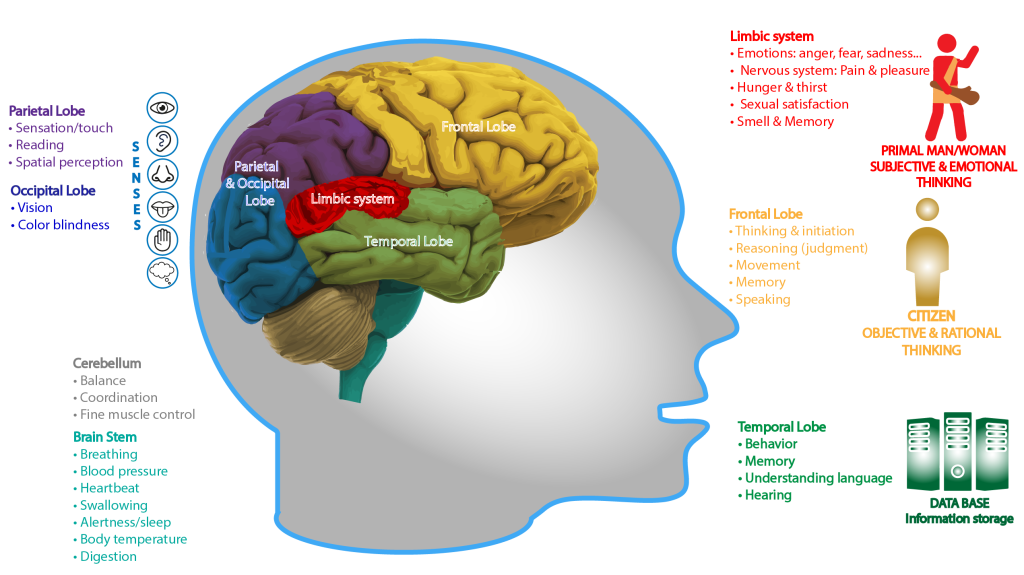
(Simplified version)
As exposed in this article, the PRIMAL mind represents your limbic system, it is your emotional brain.
The RATIONAL mind represents your frontal lobe, it is your rational brain, all details are in this article.
The merger of your PRIMAL (Emotional) & your RATIONAL mind is your THINKING CENTER.
It balances the thinking agenda & positive intent of both PRIMAL & RATIONAL minds. You can find further details about this feature of your brain in this article.
The temporal lobe is responsible for memory function, we refer to it as your DATABASE as explained in this article.
Your SENSES encompass your faculties for sensation, touch, reading, spatial perception, vision, and colour blindness, all of which are exposed in this article.
The MAP of your mind
Your mind follows an unconscious & innate process, characterised by an 8-step sequence:
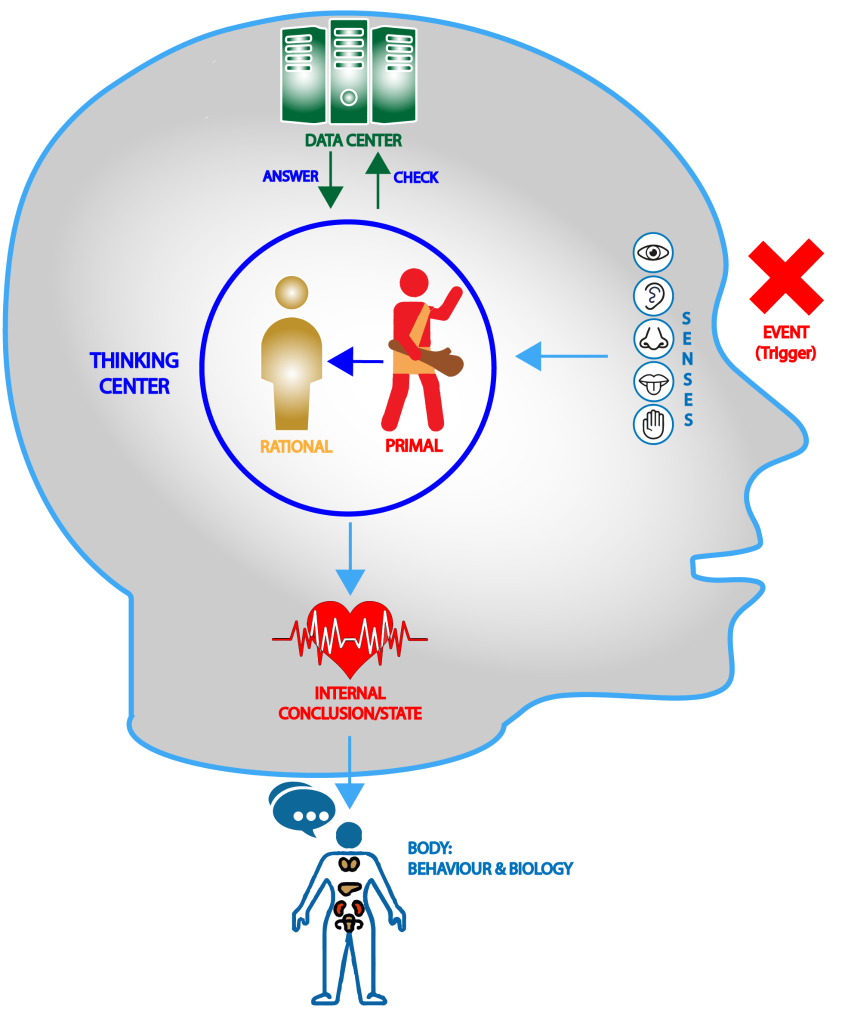
Step 1: Events
Events are occurring around you.
Step 2: Notice
You notice one specific EVENT via your SENSES.
Step 3: Scan
Your PRIMAL mind scans it (at the THINKING CENTER).
Step 4: Pass information
Your PRIMAL mind forms a perception.
It relays it to your RATIONAL mind (at the THINKING CENTER).
Step 5: Check & answer
Your PRIMAL & RATIONAL mind checks your DATABASE for information about the EVENT, receiving immediate answers.
Step 6: Regulate (If needed)
If no HUGE danger, your RATIONAL mind regulates the input of your PRIMAL mind about the EVENT (at the THINKING CENTER).
Step 7: Interpret
You give a meaning (INTERNAL CONCLUSION) to the EVENT.
Step 7: BODY reaction: BEHAVIOUR & BIOLOGY
This is how your BODY react & how your body responds to that EVENT.
The following provides a step-by-step explanation with examples at each stage.
The MIND MAP 8-step sequence:
Step 1: Events
Events are happening around you and at all times.
Examples:
– A car passing by
– A bird
– An ad for a sofa
– A baby crying
– A person sobbing …
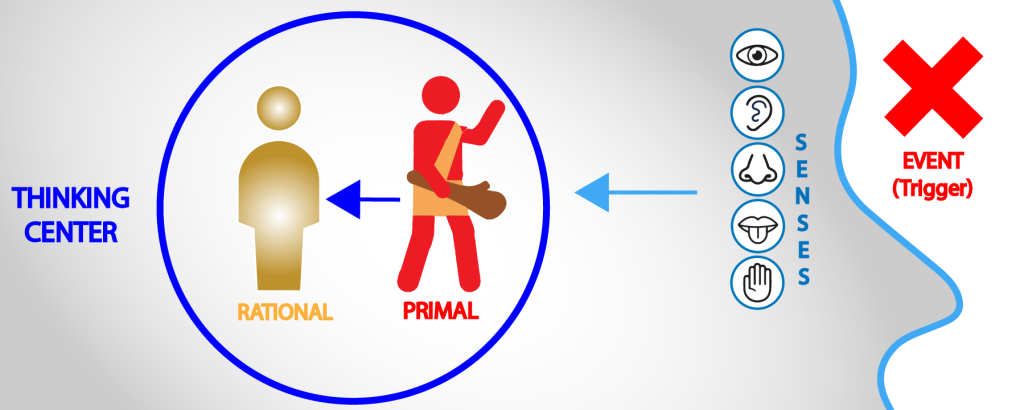
Step 2: Notice (SENSES)

The EVENT that you noticed goes through your SENSES.
This is what you:
– See
– Hear
– Smell
– Taste
– Touch
All information about this brain function is detailed in this article.
Step 3: Scan (PRIMAL mind)
The information about the EVENT goes through to your THINKING CENTER.
The EVENT is initially scanned by your EMOTIONAL (PRIMAL) mind; this is for scouting any danger & threats and attacks.
This is to:
✔ Fulfil
✔ Protect
➥ Your P.E.M. needs (Physical. Emotional. Material)
Examples:
– Someone offering a drink:
“Yes” or “No”
➥ Fulfilling PHYSICAL needs
– Someone shout at you:
You might argue with them!
➥ Caring for EGO/SAFETY
– Someone attacking you with a gun
Run away or fight back!
➥ Protecting your SAFETY needs with F.F.F instincts.
All information about your PRIMAL mind is outlined in this article, revealing the source driving your impulses, needs, and instincts.
The EVENT is first scanned by your EMOTIONAL (PRIMAL) mind for scouting danger & threats and attacks.
Step 4: Pass information (PRIMAL & RATIONAL)
As indicated in this article, your PRIMAL mind is in charge of your instinctive reactions: the FIGHT, FLIGHT, FREEZE mechanism (F.F.F.).
If your PRIMAL mind asses an EVENT as a big danger (Examples: Hearing a gunshot, someone attacking you,…) it would take over with its F.F.F. response.
If the EVENT is NOT a HUGE threat, your RATIONAL mind would regulate any PRIMAL thoughts & impulses about the EVENT per your DATABASE content.
This process is presented in this picture:
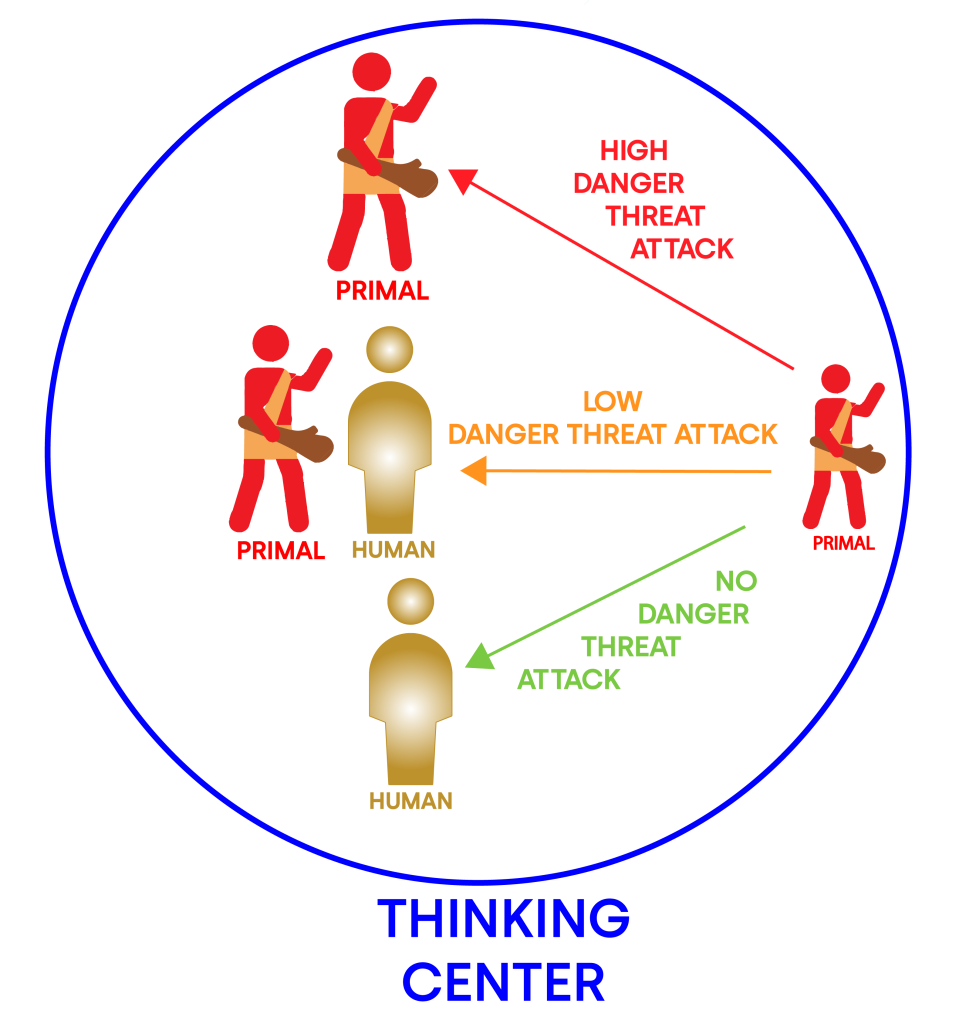
Example of RATIONAL mind regulation:
– Someone offers you a massive chocolate cake:
You might answer:
“No, thank you because xxx (reasons)”
or “Yeah I would love to, I love chocolate (reasons)“
Whatever it might be, the reason is held in your DATABASE.

If your PRIMAL mind asses an EVENT as a big danger, it would take over with its FIGHT, FLIGHT, FREEZE responses.
If NOT, your RATIONAL mind would regulate any PRIMAL thoughts & impulses per your DATABASE content.
Step 5: Check & answer (DATABASE)
Both minds check into the DATABASE for information checking & relevancy, providing immediate answers.
The DATABASE allows you to make sense of the world as it contains all the information you know.
Examples:
If you read or hear:
–“Chocolate”
–“Rain”
–“Beach”
→ You can make a picture in your mind’s eye, and maybe a sound too.
The DATABASE checking and answering can happen in less than a second.
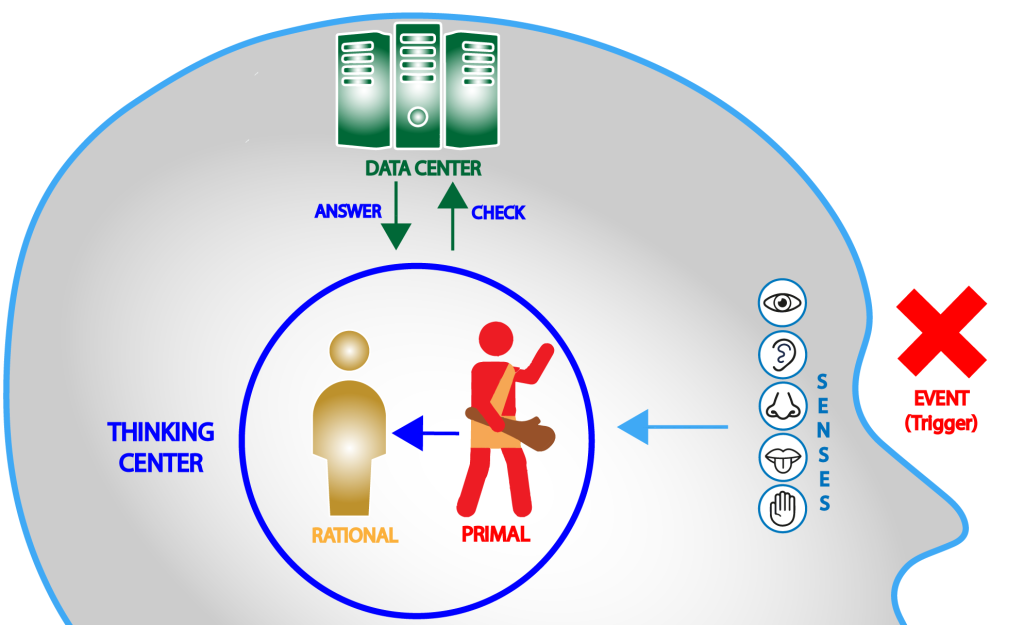
It contains data about:
– Yourself & the world around you: Beliefs (self-esteem), values, memories.
– Your know-how: Languages, skills, crafts…
– Your how-to: How you like, love, trust…
Examples:
– Someone offering you a massive chocolate cake:
You might answer:
“No, that wouldn’t be good for me”
➥ As you might KNOW (from your DATABASE) too much sugar “isn’t good for you” (Physical need)
To discover all the components of your DATABASE and raise your self-awareness, visit this article.
Both PRIMAL & RATIONAL minds check into the DATABASE for information checking & relevancy, providing immediate answers.
Step 6: Regulate (RATIONAL mind)
If the EVENT is NOT a huge threat, your RATIONAL mind would regulate any PRIMAL impulses and emotionally based responses.
Example:
– Someone offers you a massive chocolate cake:
You might THINK:
“I would love to, I love chocolate, (impulse and emotionally based response) yet that wouldn’t be good for me (Database check & regulation)”
You would then SAY:
➥ “No, I am fine, I will have something else please”
The regulation process is done at the THINKING CENTER by your RATIONAL mind.

All information about the RATIONAL mind’s functions, including its ability to regulate thoughts and impulses, is explained in this article.
For more details about your THINKING CENTER, the hub of balancing facts and feelings is articulated in this article.
If the EVENT is not a huge threat, your RATIONAL mind would regulate any PRIMAL impulses and emotional responses.
Step 7: Interpret (INTERNAL CONCLUSION)
At this stage, your brain gives INSTANTLY meaning to the event. This meaning can also be about a situation or someone, this is defining your feelings or emotions.
Examples: happy, sad, unsure, upset, excited).
In this framework, we refer to it as your INTERNAL CONCLUSION.
Examples :
– You see a dog and you might:
➥ Pet the animal or be terrified of it
-You see a meaty & greasy burger and you might:
➥ Get hungry or be disgusted by it
-You hear a song and you might:
➥ Vibe with it or find it annoying.
Simply, an event comes to your attention and your mind gives it meaning INSTANLY.
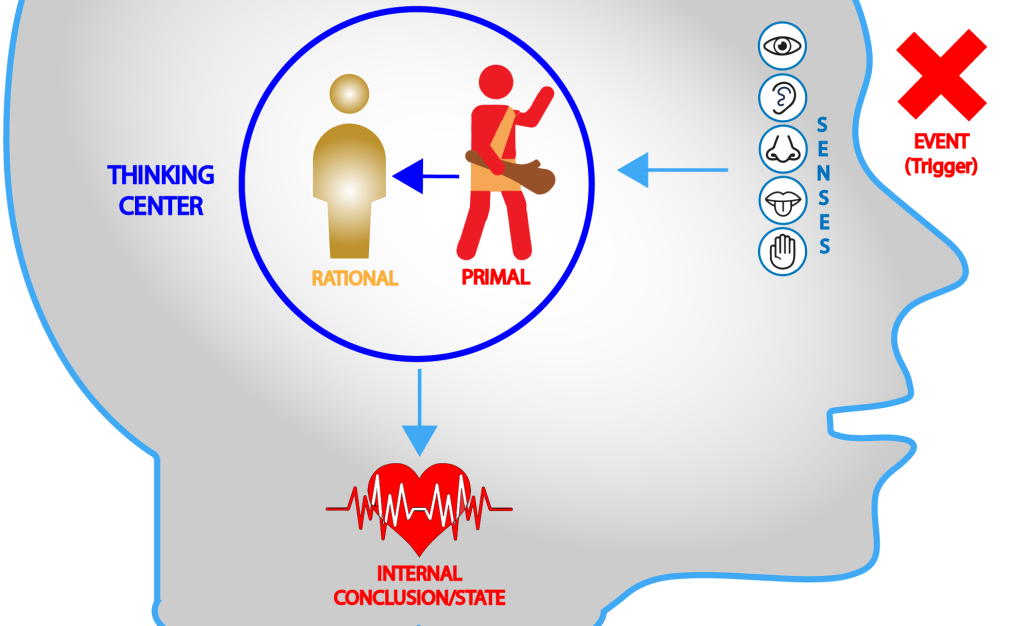
Simply put, the INTERNAL CONCLUSION gives meaning to the information of that event:
“No, that wouldn’t be good for me”
⚠️ Note: The basis of your INTERNAL CONCLUSIONS
The meaning you give to something is based on:
– The content of your DATABASE
– The rationale of the mind running at that time, it can be your PRIMAL mind or a mix of both your RATIONAL & PRIMAL mind.
Example: Remember a time you were caught up in a dispute with a loved one, can you remember which mind was running?
→ Was it under your PRIMAL mind?
Were you having impulsive & short-term emotionally charged thoughts?
Example: “Let’s get off, I want to kill that f*** guy!”
→ Was it under your RATIONAL mind?
Were you considering the dispute with perspective, evaluating its long-term consequences?
Example: Cooling yourself down and offering to speak later to avoid any further escalation.
Recognising and noticing which mind is running at any given time is another self-awareness skill. It is articulated in detail in this article.
Step 7: BODY reaction
Your BODY responds to the INTERNAL CONCLUSION with your:
– BEHAVIOUR
– BIOLOGY
The BEHAVIOUR & BIOLOGY responses occur instantaneously & simultaneously.
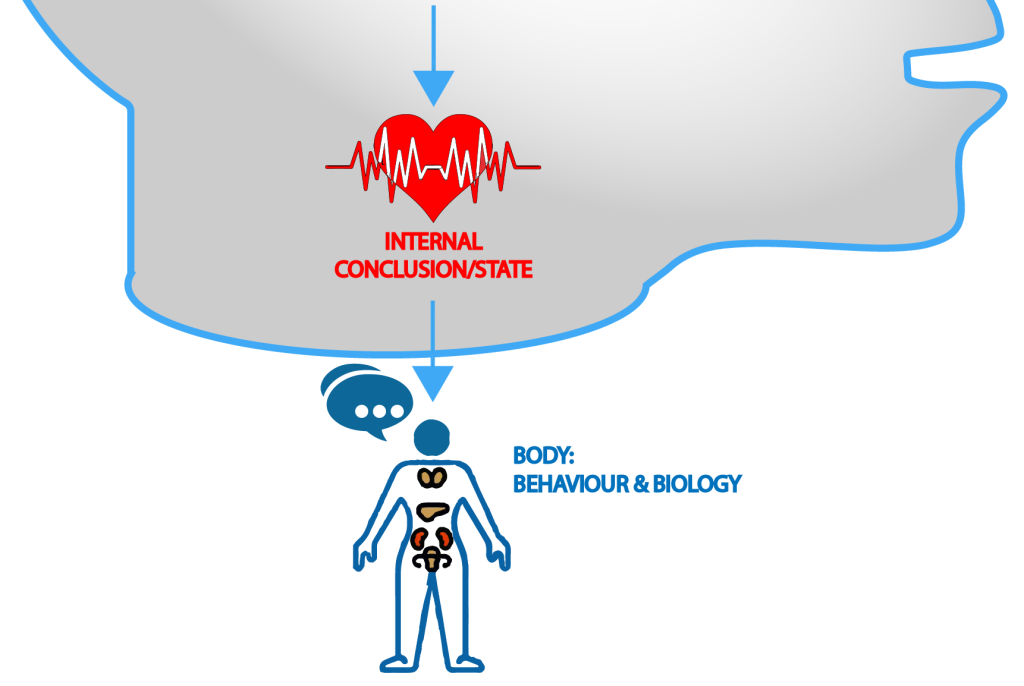
Behaviour
This is what you:
– Do: your actions
– Project: your words, facial expressions & body language
Examples :
Feeling uncomfortable and saying “No” by :
– Frowning
– Turning your raising lip corners
– Showing no with your hands
– Saying the word “No”
The BEHAVIOUR are your actions and projections, observed externally.
Biology
It is your biological response to deal with certain situations, involving hormones and neurotransmitters.
Biology is what can happen inside the body.
Hormones responses examples
Melatonin:
Released naturally towards the end of the day, it regulates your sleep/wake cycles. It is highly influenced by exposure to sunlight, bright lights and darkness.
Cortisol & adrenaline:
Different hormones are released for perceived high-stress situations: a fight, bungee jumping, an argument, running late and being stuck in traffic/train…
Neurotransmitters responses examples
Endorphins:
These are released when laughing, after exercising …
Dopamine:
Produces good feelings when consuming sugar, and coffee, engaging in sex, or browsing social media.
Oxytocin:
This is the “bonding feeling”, it is triggered by touch, cuddles, petting, strong eye contact…
Serotonin:
This feels nice and it flows when you feel like you are gaining a “one up” socially: a new job, home, a promotion, a compliment…
Practical applications
Mastering the MIND MAP 8 steps is a valuable tool to improve how well you know yourself. This is a critical asset for self-reflection, growth, setting boundaries and overall behavioural improvement.
As you get the hang of these steps, think of them as your guide for navigating around what’s happening around you.
It is something you can use every day, across several contexts to help you think more clearly and make better choices.

In personal life
Consider a situation where a friend invites you to a late-night event, but you have an early morning meeting the next day. Your PRIMAL thinking process kicks in: you’d love to go out and catch up.
Yet your RATIONAL mind, when consulting your DATABASE for evaluation of the situation, might consider the consequences of going out.
Your RATIONAL mind might help you decide and answer: “I’d love to join, but unfortunately, I have work obligations early tomorrow, so I’ll be for next time.”
In professional life
Picture a work situation where you are facing tight deadlines at work, causing you stress.
With increased self-awareness, you catch early signs like a racing heart or scattered thoughts.
Using consciously your RATIONAL thinking, you can reframe this challenge as an opportunity to showcase your skills.
Consequently, in future tight deadlines situations, you would become more able to regulate these types of thoughts.
You wouldn’t fall under the stress-causing pattern thanks to your elevated self-awareness and RATIONAL self-management.
Ultimately, helping you handle it more efficiently, and approach it confidently.
Enjoyed this article & curious to take it to the next level?
Realise that this article is an extract from the fundamentals of the Calm & Stress Management, Social Intelligence & Emotional Intelligence workshops.
These workshops are transformative blends of relaxation, mind management & communication tools & techniques.
Designed to release your best, these workshops will deliver you the methods to :
✔ Become more relaxed & reduce your stress
✔ Be in charge of your emotions & increase your well-being
✔ Develop your leadership & influence
→ For any questions about these workshops, you can schedule your FREE discovery call to find out more.
Up until next time, go learn & go RELEASE YOUR BEST !!!
